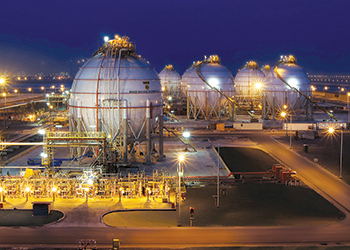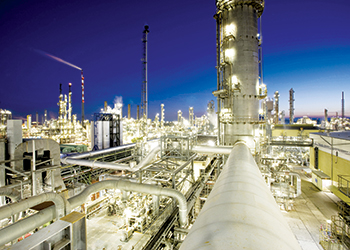
This region has more freedom in policy implementation, and can pick the most suitable and appropriate policies for its businesses. It also has lessons from across the world, Fadi Al-Shihabi, ESG Services Leader at KPMG, tells OGN
The Middle East region could be at an advantage in its energy transition journey. It has the money and resources, it’s making heavy investments in low carbon technologies and renewable energy projects, it’s not vulnerable to policy fluctuations, and it is learning from use cases from around the world.
Abdulaziz Khattak of OGN energy magazine spoke to Fadi Al-Shihabi, ESG Services Leader at KPMG, on the sidelines of the GDA international Downstream Exhibition and Conference to understand the global renewable energy landscape and other issues in the areas of energy transition and decarbonisation.
Where is the money for renewable energy going to come from, and what are the investment risks?
About 10 years ago, we needed people to put money into renewable energy; now investors are chasing projects with money in their hands.
Investors, both in the public and private sectors, sovereign funds and even banks are looking to invest in renewable energy. In fact people want to invest more in this area. So I see good investment appetite.
We now have what is called ‘green investment’, ‘green finance’ or ‘sustainable finance’. Additionally, there are green bonds on the market.
People can get good returns from green finance or green investment. The returns green finance or green bonds is also good because there is less risk.
You may ask about the operational risks if you invest in renewable energy. Well, for one, you are not vulnerable to fluctuating oil prices. All you need is the Sun, equipment, panels and consumers.
There is also less risk when it comes to composite risk; it is much lower than that in oil and gas or other conventional fuels.
So the stakeholders in renewable energy exist while on the other hand investors are more than happy to invest in the industry.
Why is the fossil fuel industry also investing in renewable energy? Doesn’t that seems contradictory?
That is in their mandate. Some companies have changed their brands, like Total, which used to be an oil and gas company. Now, it's called TotalEnergies. They have investments in other areas and in renewable energy.
Another example is Shell, which has renewable energy investments.
Therefore, it depends on the strategy of the organisation and what they want to do in the future.
Some of them already had a low carbon transition underway through either improvement in their operations or in addition investing in other areas of green energy. So what we have is a combination and diversity of investments.
But we also have the example of BP, which recently said it is going back to investment in oil and gas.
We cannot say that we will shut down the oil and gas industry for good. What we are trying to do now is to come up with low carbon fuels or become less carbon intensive.
We should also not continue to think of oil of just as fuel. Oil could be feedstock for downstream industries and other industries, such as medicine, etc.
So, what we in the oil and gas industry are trying to do is to reduce as much as possible the carbon intensity of our oil.
Also a BP like reversal could depend on a difficult situation. For example, we know that the Russian gas is not constant and, therefore, not sustainable. We have even heard about Germany going back to coal power.
So when you are in need, you have to respond to those needs. But that does not mean we ruin the good work that Europe or any other continent has done (in renewable energy).
In my opinion BP’s strategy to invest more in oil and gas is something good because that will improve the industry and will enable BP to invest more in R&D and other technologies to support a low carbon transition.
What is your opinion on the impact of EU’s carbon tax on imports from outside the continent?
Initially, countries exporting to the EU will be required to report their emissions, but we may understand other consequences later on.
In the end, it will be a global agreement, where countries will exert their maximum efforts to reduce their emissions.
So the carbon tax will sooner or later be introduced, and it might not be constant or fair to everyone. And thus I think the World Trade Organisation will come into play later on. But it’s just wait and watch for now.
What awareness have you seen in this region if such (carbon tariff) polices are introduced?
For this region they will mean opportunities, because we have oil, the technologies and the human capital.
When it comes to energy transition policy implementation, how is this region different from Europe, for example?
We in this region have more freedom to implement any policy because we are still not under any obligation. So we have options and we can pick the most suitable and appropriate policies for our businesses.
Also, we are not starting from scratch. We have got lessons from across the world, for example, what happened of late in Europe. And we are now trying to optimise the implementation here in this region.












































































